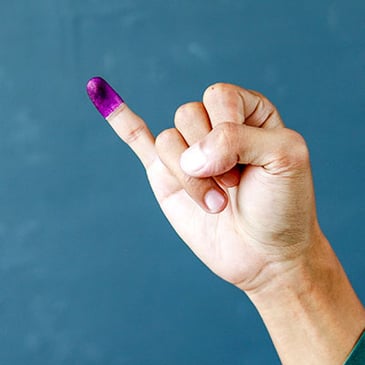Distributed ledger technologies dramatically improve upon legacy data management and processes coordination tools. The technologies can be leveraged in government and the public sector to streamline operations and enhance transparency and accountability. Use cases range from self-sovereign digital identity, to electronic health records and central banking.
Blockchain: A Tool for Enhancing Trust and Transparency in Government

The challenge comes down to data management
Governments, like all large organizations, struggle to coordinate processes across disparate stakeholders. More than most organizations, however, governments are expected to provide transparency, fairness, and accountability to the public. To be successful in these endeavors, particularly in the digital era, the challenge comes down largely to data management. Unfortunately, legacy centralized data management tools do not sufficiently meet the challenges governments face. Security of data is compromised by the single point of failure in the standard client-server model, and transparency is difficult to achieve where government databases are centralized. The result, for most governments, is slow, inefficient, and opaque operations for everything from land title registration to voting.
Leveraging a new data management structure – one that uses distributed ledgers supported by blockchain and cryptography – governments can offer citizens the streamlined, on-demand services they have become accustomed to in the digital era. At the same time, governments can go above and beyond the tech-giants by offering not only improved data security, but also unprecedented transparency and accountability.
Here are just some of the use cases of blockchain technology that governments and the public sector can apply:
Digital identity
Identity management is a cornerstone of governmental services, but legacy data management tools fail to provide secure yet rapidly accessible and updateable identity. Blockchain-based identity management offers citizens the opportunity for self-sovereign identity, meaning citizens have granular control over access to their ID, but information contained within it is instantly verifiable. As a simple example, a municipal officer scanning a citizen’s ID could confirm her name and, for instance, city of residence, without revealing any other sensitive information. With secure and verifiable digital identity in place, access to government-provided services is considerably streamlined. Blockchain-based self-sovereign digital ID, then, can form the basis for many other initiatives. Just a few examples include:
- Verifying academic credentials
- Interacting with the tax system
- Electronic health records
- Pensions
-
Grants
Registries
Governments and their legal branches serve as the primary source of truth on everything from land titles, to the registering of corporate entities, marriage and divorce records, criminal records, and more. Managing these registries is a complex proposition that, using legacy tools, results in corruption, fraud, high-costs, and slow processing.
Managing registries with blockchain-supported distributed ledgers provides the needed transparency to eliminate fraud and corruption while simultaneously offering the potential for real-time updates. The latter feature is critical for speeding up notoriously slow processes like land title transfer. For instance, in the Republic of Georgia, which was the first nation to implement blockchain based land registries, the now 1.5 million registered land titles in the blockchain-supported distributed ledger can, with the correct multiparty digital signatures, be legally transferred in a matter of minutes. This kind of functionality can lower the time and cost to completion for secured home loans, meaning real-estate deals can be completed in days rather than months.

Healthcare
Security, privacy, and interoperability issues inherent to legacy data management tools currently prevent the proliferation and utilization of electronic health records (EHRs), which can form the foundation for efficiency improvements in government-managed healthcare.
EHRs built on a blockchain-supported distributed ledger can enable some or all of the following use cases:
- Freedom of movement with the healthcare system
- Elimination of redundant onboarding procedures and tests
- Digital prescriptions that can be easily screened for potential adverse reactions
- More personalized healthcare
- Citizens taking ownership of their health data and volunteering it or selling it for research
- Incentives for citizens to make defined positive health-related choices
- Automated payments for healthcare providers and vendors.
In addition to forming the basis of next-generation EHRs, blockchain can also be leveraged to provide universal visibility and resiliency for drug and medical equipment supply chains, as well as to improve coordination in the development of medicines and medical treatments.
+ Read more on how blockchain can be applied to healthcare and life sciences
Regulation
Enforcing regulation is as onerous a task for government as adhering to regulation is for businesses. A big part of the problem is the inadequacy of legacy tools when it comes to managing the data needed for both the enforcement of and adherence to regulation. Consider the example of aviation parts, which are subject to strict regulations throughout their lifecycle to ensure safety. Parts which have been approved for use (a heavily regulated process in itself) must have their hours in operation logged and adhere to a regulated schedule for overhauls. All collected data must retain its continuity in the secondary market for aviation parts, which is an estimated $4.2 billion per year industry. Precisely tracking the provenance of aviation parts transparently and immutably is, therefore, essential for preventing fraud and ensuring safety. It is also essential for authorities to have the capacity to track and trace items granularly and in real time, as it allows authorities to identify the source of substandard part or contamination, and issue timely but targeted recalls. Blockchain-supported distributed ledgers enable all of the above features and so can streamline regulation and enhance reaction capacity in the event of emergency. Some examples of industries that can benefit from blockchain-supported regulation include:
- Aviation parts
- Pharmaceuticals
- Medical equipment
- Securities
- Food supply
Administration
Administration of government-managed programs ranging from pension systems to healthcare, education, and defense often requires coordination between disparate parties and almost always involves sensitive data that must be protected. Blockchain-supported administration systems enable real-time coordination between wide-ranging participants while also providing the needed transparency. Some examples of use cases include:
Management of government contracts
Posting and administering government contracts on a distributed ledger with granular read/write permission control can provide the needed balance between transparency and protection of confidentiality.
Sovereign wealth-fund administration
Blockchain can facilitate the transparent management of sovereign wealth funds, bolstering public confidence and ensuring adherence to, for example, sustainability goals.
Pension administration
Combining blockchain supported digital identity with pension ecosystem partners can streamline the entire pension lifecycle, from entering the workforce to expiration.
Voting
Counting votes in a timely but secure and transparent manner is a challenge faced by every democratic government. Blockchain has been proven to support voting by improving transparency and immutability in the collation period (when, after votes that have been counted at individual polling stations, they must be aggregated with other polling stations to form a consensus for a given region).
Data storage
Blockchain can be used to support digital storage of publicly accessible records. By distributing storage across multiple nodes, both the resiliency and the integrity of the data can be ensured.
Central banking
Central Bank Digital Currencies (CBDCs)
CBDCs offer a way for central banks to improve management of the money supply by, for example, quickly and efficiently getting money into the hands of citizens and businesses in the event of a liquidity crisis. CBDCs also make it possible for governments to offer a higher level of transparency into the money supply, even potentially introducing hard limits on money issuance and government spending.
Real Time Gross Settlement (RTGS)
Blockchain supported RTGS can ensure transaction privacy, provide settlement finality, and improve resiliency by eliminating the single point of failure inherent to legacy systems.
.jpg?width=365&height=365&name=Li_Government_minibook_1200x1200_1%20(2).jpg)

